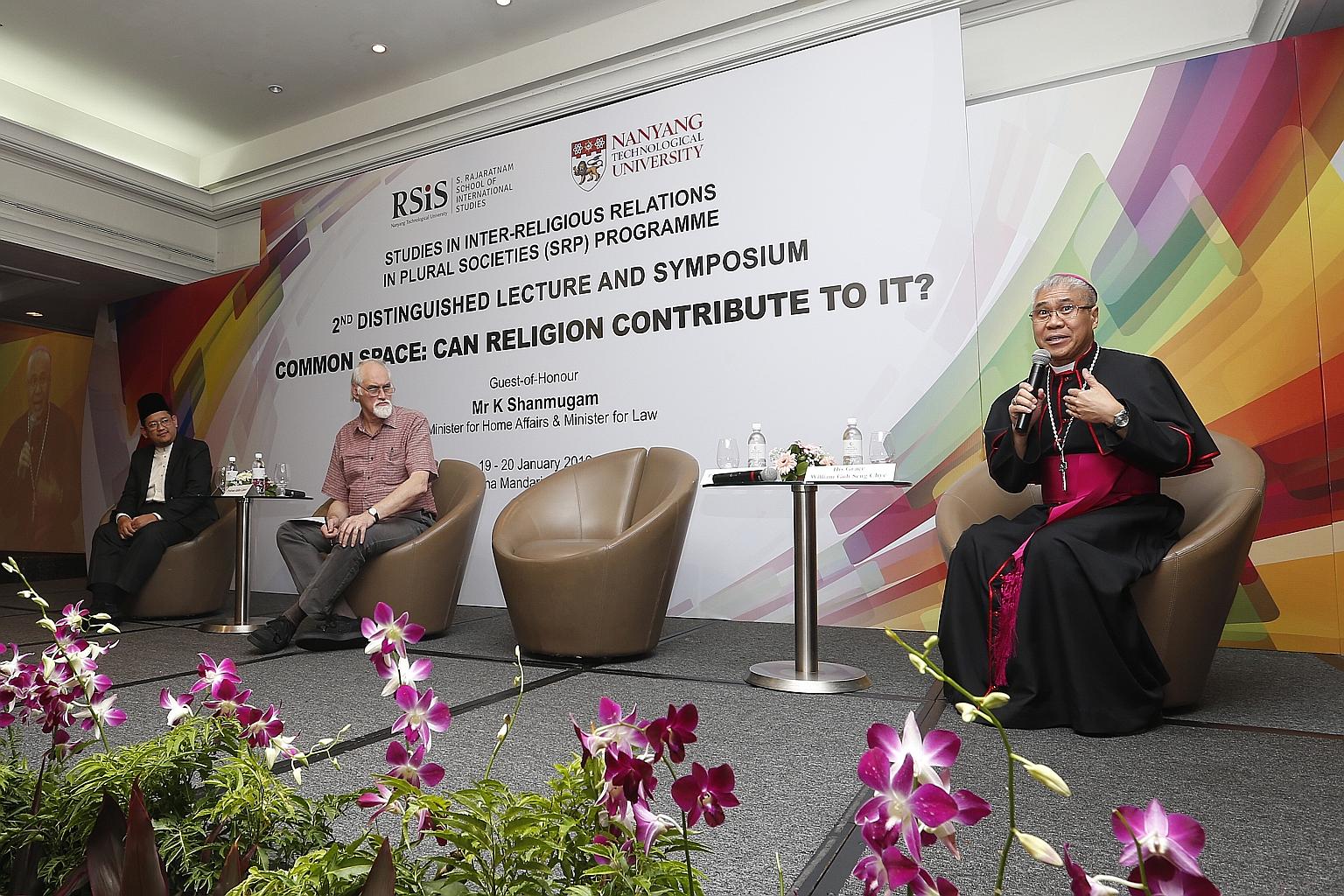Religious leaders call for more inter-faith dialogues
This will help counter threat of exclusivity among some young Muslims, and Islamophobia too
Sign up now: Get ST's newsletters delivered to your inbox

(From left) Mufti Mohamed Fatris Bakaram, Professor Julius Lipner, visiting fellow at the S. Rajaratnam School of International Studies, and Catholic Archbishop William Goh. The archbishop suggested that secular schools teach their students about all religions in Singapore, so that from a young age, they can understand the beliefs of other faiths.
ST PHOTO: LAU FOOK KONG
As Singaporeans become more religious, there are concerns that some segments of society are becoming more distant from others.
One strong antidote to this exclusive tendency, religious leaders said, lies in their followers reflecting on what their respective religions teach. This is crucial, they added yesterday at a conference on building inter-faith relations.
The leaders also called for more inter-faith dialogues to promote understanding, in the light of sectarian strife and terror attacks around the world.
Such moves will counter the threats posed by some young Muslims in Singapore distancing themselves from mainstream society, and Islamophobia. These threats were highlighted by Minister for Home Affairs and Law K. Shanmugam the day before when he opened the two-day symposium on religions held by the S. Rajaratnam School of International Studies.
Yesterday, the leaders presented ways in which organised religions can help expand the common space in Singapore for all people. The Mufti of Singapore, Dr Mohamed Fatris Bakaram, cited the Quran to show that forging a common space - where people live together harmoniously amid their differences - is a religious obligation for Muslims.
Archbishop William Goh said that Catholics, when engaging with people of other faiths, should look at what they have in common rather than their differences.
The two men also pointed out that different religions preach the same positive values such as peace, love, unity and tolerance. These qualities are all key to being a good Singapore citizen, they added.
Venerable Dr Chang Qing, an assistant professor at the Buddhist College of Singapore, said: "If your religious values and mindset are right, then you will naturally be a good citizen. But it is also important to align ourselves with the national values as a country, if not there will be divides."
But carving out this common space will not be a straightforward endeavour in a multi-cultural society, the leaders acknowledged.
Said Dr Fatris: "Each individual and each community has its own preferences, demands, aspirations, hopes and requests. So there will be times, and they come quite frequently, when these opposing demands will happen."
Hence, there was a need for give and take among the religions.
Hindu Centre president N.Varaprasad said, among other things, that people must decide whether it was important for them to attend ceremonies of other faiths, like weddings or funerals of their friends or loved ones.
So, the way forward, said Dr Fatris, is for inter-faith dialogues to help the different communities understand one another. But this may cause "some sense of discomfort or lack of confidence" among some Singaporeans.
Archbishop Goh said that one way to kill such dialogues is to start comparing religions.
"Don't say mine is better (and) yours (is) not so good. I've the fullness of truth, you've got half a truth," he said. "We cannot talk like that. If you begin a conversation like that, the dialogue finishes."
Dr Fatris pointed out that already, there are many physical common spaces for different faiths and these can be found in Housing Board estates, offices and schools.
As the right ingredients are in place, he said: "If we do not start now with a serious and constructive inter-faith religious dialogue, I think it will be a waste for Singapore as a nation."
As religious tensions rise across the world, he said Singapore should aspire towards having mutual respect among religions flourish for years to come.
He cited the case of Prophet Muhammad welcoming a delegation of Christians and letting them pray in a mosque. "I am not suggesting that we turn mosques into churches or temples, or otherwise, but these institutions can offer space for communities to understand each other a lot better," he said.
Religious and government leaders have also pointed out such examples of inter-faith cooperation in Singapore.
Master Lee Zhi Wang, president of the Singapore Taoist Mission, said the Temple of Heavenly Jade Emperor in Telok Ayer has worked with the next-door Nagore Dargah Indian Muslim Heritage Centre to run events and share resources.
Prime Minister Lee Hsien Loong said last October that a church in Sembawang opens its carpark every Friday to the Muslim congregation of a neighbouring mosque for Friday prayers.
Various religious groups had also extended invitations to members of other religious bodies for their SG50 celebrations, he added.
But Archbishop Goh said more could still be done. He suggested that secular schools teach their students about all religions in Singapore, so that from a young age, they can understand the beliefs of other faiths. "With greater appreciation comes greater unity," he said. "Otherwise, when we shield people from other religions, there will be a lot of misconceptions."
He also acknowledged the challenges in holding dialogues that can reach entire congregations - "many" of the 360,000 Catholics here do not go to church, he said.
"If we can't even get (followers) to attend the courses we offer, how to ask them to come for inter-religious courses? I mean, when you hold a course about your own faith, they don't want to come. When you offer a course on inter-religious faith, will they come?" Archbishop Goh wondered aloud.
"This is an experience felt by all the other religions," he added.
Still, the dialogues and joint events are a good way to build inter-faith friendships.
"When we are friends, we begin to treasure and cherish each other and appreciate our differences. These differences enrich us."
•Additional reporting by Lim Yan Liang


